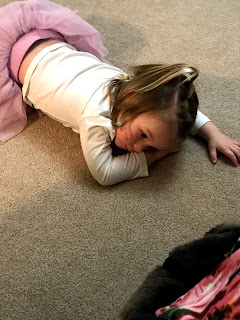If there is only one thing (which there is not just one)
that I have learned from this adoption journey in Ecuador, it's that
communication in every form is valuable.
Communication has always been important to me and I value strong
connections through honest and sincere conversations. The Human Connection (a project I have been working on for years) is a big key to what makes me tick. And what better way to dial in to the human connection than to be honored and blessed with the challenge to build a mother-daughter relationship with our newest child. A tween, might I add. Sometimes when I think of the "human connection" that I work so hard at with my other tween daughter, I ask myself, What where we thinking? However, truthfully, God placed her in our lives, and God wanted us to experience this #adoptionjourney for a reason. I count my blessings everyday for this blessed child. However, it's becoming clearer to me as I wake up each day with a new opportunity to communicate and connect, in her native land and tongue.
My kids know their stories.
They know who they are, and where they come from, both heavenly and
earthly. There really are no secrets in
our house, when it comes to their value, their truth, and their heritage. If my kids come to us with questions, we as
parents answer in the most age appropriate and protective way as possible. In other words, we protect the privacy of
their birth-parents and their own need to know minds. However, with such open adoptions, my
children know quite a bit about their stories and their birth parent's
stories. They are still only 12, 12 and
10, so with our focus on their growth and development priorities, it makes our
communication skills a little imaginative.
I truly value good communication, it helps me to connect
with others and also parent properly. I
am far from being an expert in parenting, merely a student. I feel that there have been some very
valuable experiences in our lives that have been uplifted through good
communication. My oldest daughter is not
a talker (she's quite like her dad) and it has been a mountain to climb for
me. Obviously, I know how to ramble, and
when I have a thought, I am not too shy to share. Whereas with her, it's like pulling teeth to
get her to share her thoughts, feelings or anything. As she has grown into the tween stage, she is
a little better, but I have had to learn different
ways to communicate with her. For
example, riding horses, being with animals, or asking about a book she has
read; this is where the girl shines. Her
non-verbal cues are key for me as her mother.
So sitting down and chatting with her, has a lot
to be desired. But I love our
silent conversations and watching her in her element, those times share so much
information for me.
My youngest son, however, he is a lot more like me when
it comes to verbal communication. He is loud, and expressive and has no
filter. Everything on his mind, comes
out like vomit. Often we are cleaning up
a mess afterwards, but I understand his language, I am very familiar with
it. He and I can communicate well, and I
am cautious to ever silence him. I do
however have a more appreciation for what my parents had to deal with when I
was a child. I love to hear with
auditory cues and his expressive words all that he has to share.
The adoption process we are on currently has been an eye
opener for us as parents, in so many ways.
Communication with the language barrier alone has been a huge hurdle,
and we are just beginning this lesson.
My perspective of how we parent is taking on a new role. How we listen to our children, how we teach
them and even what we teach. Ok, let's
break down what I mean by communication.

First: Non-verbal communication - The nonlinguistic
transmission of information through auditory, visual, tactile and kinesthetic
channels. It's important to have a basic
knowledge of information regarding communication skills, to know what type is
best for you, or where you can stand to learn more. With our other two children, being infant
domestic adoptions, teaching and learning to communicate with them came pretty
naturally. As with all parents, you
watch them grow and explore, babble and scream, make all kinds of noises (from
all parts of the their body). All these forms of direct communication can
be very informative, educational and part of the developing process as a
parent. Even as babies, before actual
words are spoken you have non-verbal communication
Second: Verbal Communication - The imparting or exchanging
of information and news. In its most
basic form, communication is to merely provide information. "Are you hungry?", "What do
you want to eat?", “Where are you going?”, etc. As I learn to speak a new language and only
with simple commands and prompt phrases, I struggle to be able to really dive in
and connect on a level of communication I desire. Child #3, second daughter and middle
child. This is where my learning as a
parent has taken monumental strides in the communication realm. We have adopted her through an orphan
international experience. I am writing
this from her birth country while waiting to return home with her. She comes to us as a tween, from an
orphanage, speaking a completely different language and with so much in her
story. 5
weeks I have been here with her. Sent my
husband home last week to be with the other two kids. And now, I am the only English speaking one
left. We had grandma and grandpa with us
for a couple weeks, but after they left, Carl and I could speak together. Now is it me and her.
So here I am, giving as much effort as I can muster. This adoption process has been our longest by
far. Eight years of praying, with failed adoptions along the way and now two
years of paperwork and hoops to jump for this one. My energies are nearly spent on the
international adoption process. Therefore learning to speak her
language has been difficult at its best.
All while encouraging her to learn English, as this will be her primary
language when we get home. We have been
extremely blessed to make new friends and family here in her country, but while
at meals and events, church and adoption meetings, my ears are wide open to try to understand
the verbal language. However, I have
noticed that I am understanding the meaning behind the words more while being
in tune to the non-verbal cues. Thank
you daughter number 1 for practice in that skill. Body language, informal sign language and
facial expressions have been my saving grace.
Even finger pointing has its purpose, and
I don't mean the middle one that you often see with the crazy driver's
here. Haha!
While learning to parent this beautiful soul, during the
most awkward and difficult age, with only the basic knowledge of verbal phrases
in her language, this is where the journey really begins for us. When one skill is lacking, the others stand
at attention and really help get the job done.










































